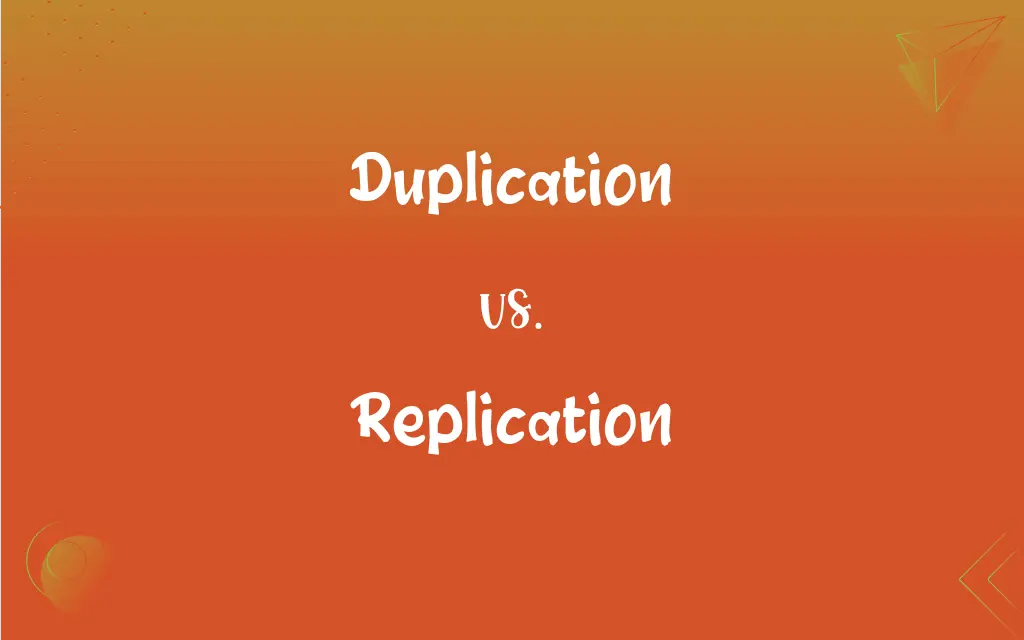Duplication vs. Replication: What's the Difference?
Edited by Janet White || By Harlon Moss || Published on December 30, 2023
Duplication is the process of making an exact copy of something, while replication involves reproducing or repeating a process, often in a different context or over time.

Key Differences
Duplication refers to the act of creating an exact copy or duplicate of an original item, emphasizing precision and similarity, like photocopying a document. Replication, however, often implies recreating a process or system, possibly in a different environment, such as replicating a scientific experiment.
In duplication, the focus is on the output being a mirror image of the original, maintaining all characteristics, as seen in data duplication in computing. Replication, on the other hand, may not always result in an exact copy; it can involve repeating a process or method, like in the replication of research findings.
Duplication is commonly used in contexts where exactness is crucial, such as in legal or administrative settings. Replication is more about consistency in process or results over time or in different settings, like in biological cell replication.
In duplication, the original and the duplicate are typically expected to be indistinguishable, used in areas like manufacturing or digital data. Replication can involve adaptation or slight variations, especially when applied in new contexts or environments, like cultural replication.
Duplication often implies a one-time or static process, focusing on creating a single, exact copy. Replication suggests a dynamic process, possibly ongoing, emphasizing the ability to reproduce results or processes consistently across different instances.
ADVERTISEMENT
Comparison Chart
Primary Focus
Making an exact copy
Reproducing a process or system
Result Expectation
Exactness and similarity to the original
Consistency in process, possibly with variations
Typical Contexts
Legal, administrative, data duplication
Scientific experiments, biological processes
Nature of Process
Static, one-time action
Dynamic, possibly ongoing
Adaptation and Variation
Minimal, emphasizes precision
Allows for adaptation or slight variations
ADVERTISEMENT
Duplication and Replication Definitions
Duplication
Duplication can be a one-time, exact process.
Duplication of the report ensured everyone had a copy.
Replication
Replication involves reproducing a process or system.
The replication of the experiment yielded similar results.
Duplication
Duplication involves reproducing something precisely.
He specialized in the duplication of antique furniture.
Replication
Replication focuses on consistency over time.
Cell replication is a key biological process.
Duplication
Duplication means creating an exact copy of something.
The duplication of the key was perfect.
Replication
Replication can imply repeating something in a different context.
His success in replication of the business model was remarkable.
Duplication
Duplication emphasizes similarity and precision.
The artist's duplication of the painting was impressive.
Replication
Replication is about reproducing results or processes.
The replication of the software in the new hardware was successful.
Duplication
Duplication is often used for preserving data.
Data duplication is essential for backup.
Replication
Replication may involve adaptation or variations.
Replication of the study in a new environment was challenging.
Duplication
The act or procedure of duplicating.
Replication
The act or process of replicating something.
Duplication
The condition of being duplicated.
Replication
(Biology) The process by which genetic material, a single-celled organism, or a virus reproduces or makes a copy of itself.
FAQs
What is replication?
Reproducing a process or system, often over time.
Is duplication always exact?
Typically, it aims for exactness.
What is duplication?
Creating an exact copy of something.
What is an example of replication?
Replicating a scientific experiment.
Is replication more about process or product?
Often more about process.
Can replication involve variations?
Yes, it can include adaptations.
Does duplication require the original?
Yes, to create a precise copy.
Can duplication be digital?
Yes, like duplicating files or data.
What's a key aspect of replication in science?
Consistency of results.
Where is duplication commonly used?
In data storage, legal documents.
Is duplication a one-time action?
Generally, it's a single process.
What's a practical use of duplication?
Making copies of important documents.
Is precision important in duplication?
Yes, it's essential for accuracy.
Does replication require an original?
It often starts with an original process.
Can duplication be manual or automated?
It can be either, depending on the context.
Can replication be ongoing?
Yes, like in biological cell replication.
How is replication used in research?
To validate findings by repeating studies.
What does duplication aim to preserve?
The exact features of the original.
Is replication important in learning?
Yes, as it involves practicing and repeating skills.
Can replication be used in business?
Yes, like replicating a successful strategy.
About Author
Written by
Harlon MossHarlon is a seasoned quality moderator and accomplished content writer for Difference Wiki. An alumnus of the prestigious University of California, he earned his degree in Computer Science. Leveraging his academic background, Harlon brings a meticulous and informed perspective to his work, ensuring content accuracy and excellence.
Edited by
Janet WhiteJanet White has been an esteemed writer and blogger for Difference Wiki. Holding a Master's degree in Science and Medical Journalism from the prestigious Boston University, she has consistently demonstrated her expertise and passion for her field. When she's not immersed in her work, Janet relishes her time exercising, delving into a good book, and cherishing moments with friends and family.






































































